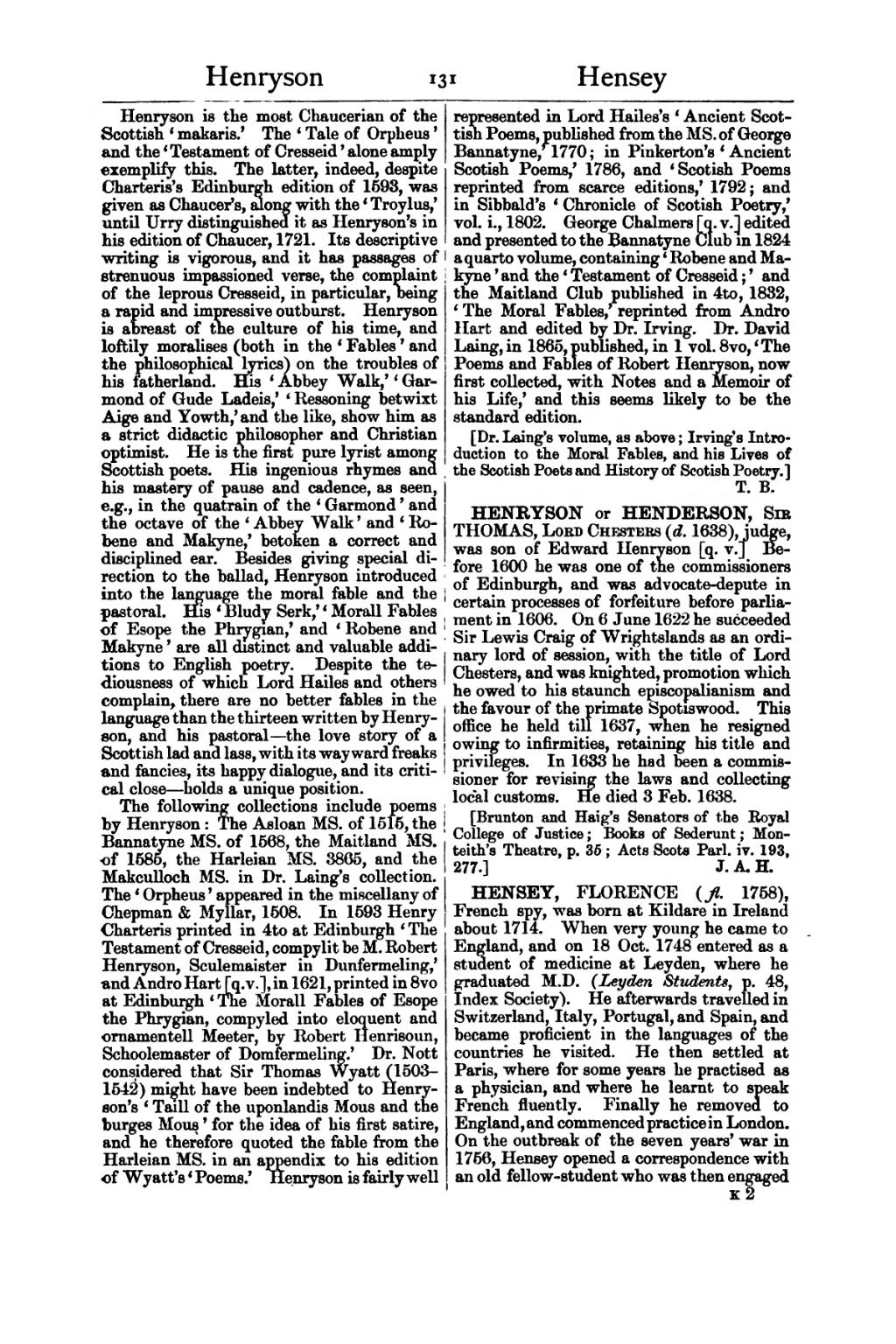Henryson is the most Chaucerian of the Scottish ‘makaris.’ The ‘Tale of Orpheus’ and the ‘Testament of Cresseid’ alone amply exemplify this. The latter, indeed, despite Charteris's Edinburgh edition of 1593, was given as Chaucer's, along with the ‘Troylus,’ until Urry distinguished it as Henryson's in his edition of Chaucer, 1721. Its descriptive writing is vigorous, and it has passages of strenuous impassioned verse, the complaint of the leprous Cresseid, in particular, being a rapid and impressive outburst. Henryson is abreast of the culture of his time, and loftily moralises (both in the ‘Fables’ and the philosophical lyrics) on the troubles of his fatherland. His ‘Abbey Walk,’ ‘Garmond of Gude Ladeis,’ ‘Ressoning betwixt Aige and Yowth,’ and the like, show him as a strict didactic philosopher and Christian optimist. He is the first pure lyrist among Scottish poets. His ingenious rhymes and his mastery of pause and cadence, as seen, e.g., in the quatrain of the ‘Garmond’ and the octave of the ‘Abbey Walk’ and ‘Robene and Makyne,’ betoken a correct and disciplined ear. Besides giving special direction to the ballad, Henryson introduced into the language the moral fable and the pastoral. His ‘Bludy Serk,’ ‘Morall Fables of Esope the Phrygian,’ and ‘Robene and Makyne’ are all distinct and valuable additions to English poetry. Despite the tediousness of which Lord Hailes and others complain, there are no better fables in the language than the thirteen written by Henryson, and his pastoral—the love story of a Scottish lad and lass, with its wayward freaks and fancies, its happy dialogue, and its critical close—holds a unique position.
The following collections include poems by Henryson: The Asloan MS. of 1515, the Bannatyne MS. of 1568, the Maitland MS. of 1585, the Harleian MS. 3865, and the Makculloch MS. in Dr. Laing's collection. The ‘Orpheus’ appeared in the miscellany of Chepman & Myllar, 1508. In 1593 Henry Charteris printed in 4to at Edinburgh ‘The Testament of Cresseid, compylit be M. Robert Henryson, Sculemaister in Dunfermeling,’ and Andro Hart [q. v.], in 1621, printed in 8vo at Edinburgh ‘The Morall Fables of Esope the Phrygian, compyled into eloquent and ornamentell Meeter, by Robert Henrisoun, Schoolemaster of Domfermeling.’ Dr. Nott considered that Sir Thomas Wyatt (1503–1542) might have been indebted to Henryson's ‘Taill of the uponlandis Mous and the burges Mous’ for the idea of his first satire, and he therefore quoted the fable from the Harleian MS. in an appendix to his edition of Wyatt's ‘Poems.’ Henryson is fairly well represented in Lord Hailes's ‘Ancient Scottish Poems, published from the MS. of George Bannatyne,’ 1770; in Pinkerton's ‘Ancient Scotish Poems,’ 1786, and ‘Scotish Poems reprinted from scarce editions,’ 1792; and in Sibbald's ‘Chronicle of Scotish Poetry,’ vol. i., 1802. George Chalmers [q. v.] edited and presented to the Bannatyne Club in 1824 a quarto volume, containing ‘Robene and Makyne’ and the ‘Testament of Cresseid;’ and the Maitland Club published in 4to, 1832, ‘The Moral Fables,’ reprinted from Andro Hart and edited by Dr. Irving. Dr. David Laing, in 1865, published, in 1 vol. 8vo, ‘The Poems and Fables of Robert Henryson, now first collected, with Notes and a Memoir of his Life,’ and this seems likely to be the standard edition.
[Dr. Laing's volume, as above; Irving's Introduction to the Moral Fables, and his Lives of the Scotish Poets and History of Scotish Poetry.]
HENRYSON or HENDERSON, Sir THOMAS, Lord Chesters (d. 1638), judge, was son of Edward Henryson [q. v.] Before 1600 he was one of the commissioners of Edinburgh, and was advocate-depute in certain processes of forfeiture before parliament in 1606. On 6 June 1622 he succeeded Sir Lewis Craig of Wrightslands as an ordinary lord of session, with the title of Lord Chesters, and was knighted, promotion which he owed to his staunch episcopalianism and the favour of the primate Spotiswood. This office he held till 1637, when he resigned owing to infirmities, retaining his title and privileges. In 1633 he had been a commissioner for revising the laws and collecting local customs. He died 3 Feb. 1638.
[Brunton and Haig's Senators of the Royal College of Justice; Books of Sederunt; Monteith's Theatre, p. 35; Acts Scots Parl. iv. 193, 277.]
HENSEY, FLORENCE (fl. 1758), French spy, born at Kildare about 1714. When very young he came to England, and on 18 Oct. 1748 entered as a student of medicine at Leyden, where he graduated M.D. (Leyden Students, p. 48, Index Society). He afterwards travelled in, and studied the languages of, Switzerland, Italy, Portugal, and Spain, and became proficient in the languages of the countries he visited. He then settled at Paris, where for some years he practised as a physician, and learnt French. Finally he removed to England, and commenced practice in London. On the outbreak of the seven years' war in 1756, Hensey opened a correspondence with an old fellow-student who was then engaged
